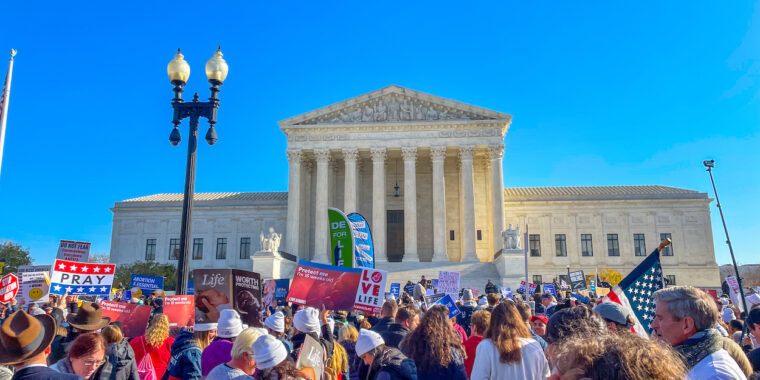
After almost 50 years under the Supreme Court rulings of Roe v. Wade (1973) and Doe v. Bolton (1973) which together legalized abortion for any reason through all nine months of pregnancy, Americans may soon once again see a nation where abortion is no longer legally protected by judiciary ruling. On December 1, 2021, the Supreme Court held a hearing for a case that directly challenges the precedent of viability established under the ruling of Planned Parenthood v. Casey (1992). This case, Dobbs v. Jackson Women’s Health Organization, was presented by Mississippi Attorney General, Lynn Fitch, which was further appealed to the Supreme Court, asking for a final legal ruling on the 15-week abortion passed by the state legislature.
While a ruling on this case will not likely be issued until this coming June, expert policy analysts and lawyers expect that there will be some change in national abortion legality, whether it be a partial or full reversal of Roe and Doe. This expectation is mirrored by the emphasis shift from the abortion industry, namely Planned Parenthood and their lobbyists, from surgical abortion access to chemical/medication abortion access. Since the use of mifepristone (Mifeprex) was approved under the Clinton FDA in 2000, two-part chemical abortions have risen to encompass 39% of all abortions by the most conservative estimates – as of 2017. Some estimations conclude that this number is closer to 50% as of 2021. Studies show that chemical abortion is four times more dangerous than surgical abortion.
The abortion industry has even taken their tactics as far as using the COVID-19 pandemic to push the availability of chemical abortion via telemedicine. Abortion is dangerous and the lack of professional medical oversight during telemedicine abortion shows a complete lack of care for women. But the abortion industry takes this abuse and manipulation of women further by discrediting the abortion pill reversal process. This process uses an influx of natural progesterone to counteract the inhibition of progesterone by the first pill (mifepristone). The Abortion Pill Reversal Network has reported success rates of this method as high as 64-68%.
Even if Roe v. Wade and Doe v. Bolton are fully overturned this coming summer, the fight to end abortion is by no means over. If Roe and Doe are overturned, abortion will not be illegal nationally. Instead, the decision between protecting the preborn and protecting abortion will be given to the states, as was originally intended under federal law. There is no “right to abortion” embedded in the Constitution of the United States. Some states already have passed “trigger laws” that will make abortion illegal in their state if Roe and Doe are overturned. It is projected there are a total of 26 states that have a trigger law in place or are likely to make abortion illegal in their state.
But preparations should consist of more than taking the fights to the states. A Post-Roe America must be about making abortion unthinkable as well. It is essential that resources are divested from the abortion industry to pregnancy resource centers (PRCs) and federally qualified health centers (FQHCs) which provide practical supportive services to empower mothers and fathers to choose life for their child. We see a model for this continued, expanded, and life-affirming support after the passage and upholding of the Texas Heartbeat Act. After the 6-week abortion restrictions were placed in Texas, the Texas Department of Health and Human services created the Abortion Alternatives Program, a $100 million program that funds parenting supplies, counseling services, medical care and social services programs, housing and maternity home support, and parenting and life-skills classes. This is only a start tothe care that can be provided to empower parents navigating an unexpected pregnancy when resources are divested from the abortion industry. Legislatively, the pro-life movement is lobbying to push bills that focus on nationally reforming and expanding the adoption and foster care systems. In a Post-Roe America, life is affirmed in culture and law. In a Post-Roe America, no woman stands alone.


Leave a Reply